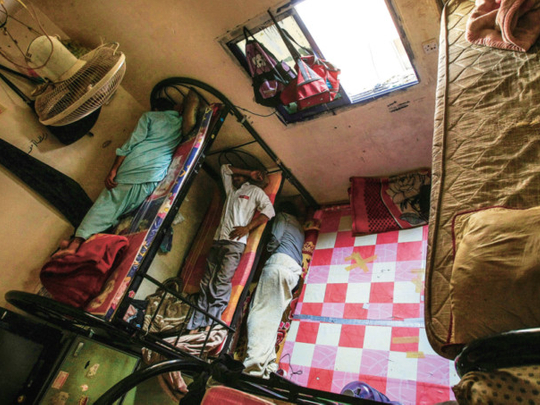
DUBAI Arun, 40, is a carpenter from the Indian state of Gujarat. He came to Dubai in December last year with dreams of making it big. But one fateful night he fell from the bunk bed in his labour camp. His life was shattered as he was rendered a penniless quadriplegic. “What can I say about destiny? I can use neither my hands nor legs now,” he told XPRESS a day before returning home on a stretcher last week.
N. Indaiah, 37, another Dubai worker who met a similar fate, is not even alive to tell his story. Paralysed after falling from his bunk bed, he was forced to go back to Hyderabad in India three months ago but died a few weeks later. He was the only breadwinner of his family and today his young wife and two daughters are struggling to survive.
Such cases are not isolated. According to social workers and lawyers, bunk bed falls in labour camps in recent months have left a number of workers paralysed. Invariably, they return home empty-handed because they don’t receive any compensation as the mishaps don’t come under the purview of worksite accidents.
The UAE labour law clearly stipulates that a work accident is an accident suffered by an employee at his place of work or while travelling to or from his place of work (see box).
Vinod Varma of Lavinos Legal Consultancy said: “As per Article 149 and 151 of the Labour Law, compensation should be equal to the worker’s basic remuneration for 24 months provided that it is not less than Dh18,000 or more than Dh35,000. But this is applicable only for work accidents and does not cover accidents during sleep or outside working hours, even if they occur in a labour accommodation.”
Varma, who deals with such cases regularly, said: “A number of workers come to us saying their companies have not paid them any compensation. But we can’t file any case against the companies because it is not binding on them to provide 24-hour cover. Most of them bear the workers’ immediate medical expenses when such mishaps occur and subsequently send them home with a one-way ticket.”
Humanitarian considerations
Social worker Pam Gauri said humanitarian considerations should take precedence over technicalities.
“Bunk bed mishaps are eminently avoidable. We need to ask ourselves why they happen in the first place? At one point last year, we were trying to help out with 10 cases in one hospital alone in Dubai.”
Last year, XPRESS carried a cover story titled “Three-tier nightmare for workers,” which exposed a spate of bizarre bunk bed falls, resulting in grave injuries, even death, as workers in shared accommodations at labour camps and villas converted two-tier bunk beds into three tiers to save space and rent.
Mohammad Hanif, a Pakistani painter, now back in his home country, recollected how he suffered a crippling spinal injury when he fell from the top-most level of a three-tier bed. His shared accommodation had six beds, with two levels for each bed. But the workers had created another level in one of the bunk beds by extending its height with pipes so that they could add another mattress. It was not allowed, but they did it because they could split the rent by three.
Gauri said even where the bunk beds have two levels, the top tiers can be unsafe. “Companies should provide railings to these beds to minimise the chances of a rollover. Bunk bed falls happens when the workers turn over or pull a blanket over themselves during sleep. Sometimes, they could be drunk as well.”
Indian worker Manoj said he fell when he was trying to pull the blanket to cover himself. He was hospitalised for three months and returned home an empty-handed quadriplegic.
An employer of a fabrication unit with over 100 workers said: “Stringent checks on labour camps are carried out but if accidents are still taking place it’s because the rules are being flouted.”
According to Varma, the problem is not unsurmountable. “Companies can include 24-hour coverage in the workmen’s compensation policy in addition to providing personal accident insurance.”
What the law says
A work accident is an accident suffered by an employee at his place of work or while travelling to or from his place of work. The employer has to pay the cost of the employee’s treatment in a government or private clinic until the employee recovers or his disability becomes certain. If the injury prevents the employee from performing his duties, the employer should pay him a grant equivalent to his wage during the treatment period or for six months, whichever is less. If the treatment takes more than six months, the grant is reduced by half for an additional six months or until the employee recovers, his disability becomes certain or in the event of his death, whichever comes first.
YOUSPEAK: What can be done to prevent such accidents?













